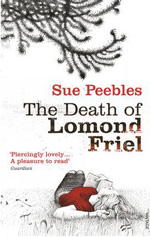

Vintage (UK), paperback, 9780099539858
At some point in our teenage years or in early adulthood, most of us will come face to face with the loss of someone close to us, a parent, grandparent, other relative or friend. Loss affects everyone differently; some carry on as if nothing has happened, whilst others might fall apart completely or react with rage. Sue Peebles deals with the subject of loss in The Death of Lomond Friel: the slow loss of good health, the loss of a parent at a very early age and the loss of direction and perspective in life. Loss is dealt with from the perspective of those who are left behind, and through Lomond Friel who experiences the loss of his speech, mobility and his faculties.
Confronted by a range of not entirely likeable characters dealing with the stroke of the father figure in the book, Lomond Friel. There is Rosie, the scatty, high flying, heavy drinking daughter who just has to be the centre of attention. There is Jacob, the overbearing, officious and patronising older brother. Then there is the absent twin brother, William, who is incommunicado, doing charity work in Africa. We are also presented with Heath, Lomond’s immaculate, self sufficient 84-year old sister, who eats the same food on each day of the week, every week. At the centre of this bustling family is Lomond, a quiet, self-sufficient, unassuming, and academic man.
Sue Peebles presents most of the book from the points of view of Rosie, Lomond, and Aunt Heath, amongst others. She effectively portrays Lomond’s sense of shock and despair at being stuck in a body that is suddenly helpless, contemplating his own suicide but being unable to carry it through, and of being unable to express himself in a planning meeting that concerns him. Heath, 15 years older than Lomond, lies alone in the darkness of her home and panics about the loss of her little brother, of being left alone without a member of her birth family left. We follow Rosie as she spirals into alcoholism, missing work for weeks on end, hatching plans to care for her father which never come to fruition, and falling apart.
The plotting of The Death of Lomond Friel is straightforward; it simply charts the impact of a stroke upon all members of a family. In this sense, the story is universal but utterly personal. It also reminded me that our lives are made up of layers of meaning, that we are shaped by each experience and each loss. Irrespective of our religious convictions, each of us contemplates our mortality and our worth in the void that is left when someone is lost.
The Death of Lomond Friel doesn’t tell a story that hasn’t been explored before, and it doesn’t use a new stylistic
technique. As a contemplation of what it means to be alive, what it means to love and to lose someone you love, it is moving
and momentous.
